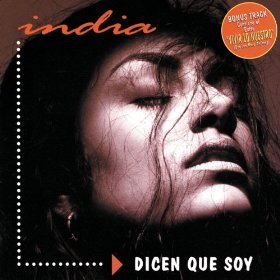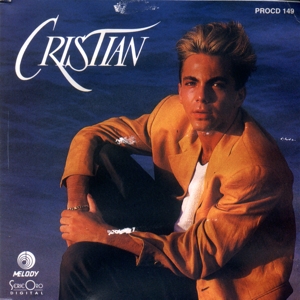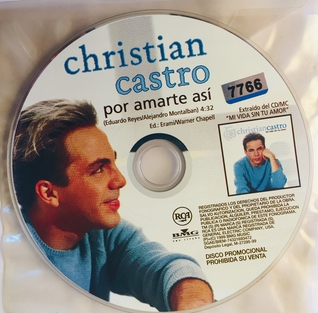
Brenda Joy Kaplan, known by her stage name Brenda K. Starr, is an American singer and songwriter. She is well known originally in R&B, dance and pop but now mostly in salsa-based music. She is also well known for her 1980s work with freestyle music.

"No me enseñaste" is one of the most successful singles of Thalía to date, taken off her self-titled studio album Thalía. It was released as the second single in America, meanwhile it was released as the third one in Europe.

Sentimiento is the sixth studio album by Puerto Rican recording artist Ivy Queen. It was released on March 27, 2007 by Univision Records. The album features production collaborations with several Puerto Rican music producers including Monserrate & DJ Urba, Noriega, and Luny Tunes. It also features vocal collaborations with Don Omar, Arcángel, Tito "El Bambino", Ken-Y, Randy and Naldo. The album includes solo performances by Baby Rasta, Divino, Mikey Perfecto, Naldo and Noriega. Musically, the album alternates between reggaetón, bolero, and salsa. The move in musical composition from reggaetón and hip hop is credited to Queen's evolution as a musical artist.

Temptation is the seventh studio album by American singer Brenda K. Starr. It was released on March 26, 2002 on Sony Discos.

Todo a Su Tiempo is the second studio album by American recording artist Marc Anthony, released by RMM Records on May 31, 1995. The album was produced by Sergio George, who was also involved with production of Anthony's debut studio album, Otra Nota. The album comprises five new compositions, three of which were written by Omar Alfanno, and four cover versions. Eight singles were released from the album, all but one of which topped the Billboard Tropical Songs chart.

Dicen Que Soy is the third studio album by Puerto Rican recording artist La India released on September 20, 1994, by RMM Records. The album was produced by American musician Sergio George, who chose the songs for India to record with an emphasis on feminism to suit with her voice. The production mixes salsa music with other rhythms such as funk and timba. Five singles were released from the record with "Nunca Voy a Olvidarte" and "Ese Hombre" topping the Billboard Tropical Songs chart.
The Tropical Airplay chart is a record chart published by Billboard magazine introduced in 1994. The first number-one song on the chart was "Quien Eres Tu" by Luis Enrique. Originally, rankings on the chart were determined by the amount of airplay a song received on radio stations that primarily played tropical music, namely music originating from the Spanish-speaking areas of the Caribbean such as salsa, merengue, bachata, cumbia, vallenato, and tropical fusions. Any song, regardless of its genre, was eligible for the chart if it received enough airplay from the panel of tropical music radio stations being monitored.

"El Amor" is a song by Puerto Rican singer Tito El Bambino. It was composed by Tito and Joan Ortiz and released on February 9, 2009, as the second single from his third studio album, El Patrón (2009). The song blends the sounds of Latin pop with cumbia and merengue. A regional Mexican and a salsa version were recorded and included on the special edition of the album.
"No Matter What" is the fourth single from freestyle singer George Lamond's debut album Bad of the Heart featuring Brenda K. Starr. In 1993, Lamond recorded a Spanish-language version as "No Morirá" with Lisa Lopez on his album Creo en Ti.

"Nunca Voy a Olvidarte" is a song written by Roberto Belester and first recorded by Mexican grupero band Bronco for their album Salvaje y Tierno (1991). In the song, the protagonist is leaving and vows to never forget the time he spent with his lover. In 1993, Mexican singer-songwriter Cristian Castro covered the song on his album, Un Segundo en el Tiempo. Castro's version peaked at number-one on the Billboard Hot Latin Songs chart in the United States became his first number-one single.

"Por Amarte Así" is a song written by Alejandro Montalbán and Eduardo Reyes and performed by Mexican recording artist Cristian Castro. It was produced by Kike Santander and released in 2000 as the fourth single from his sixth studio album Mi Vida Sin Tu Amor (1999). Lyrically, the song is about a man who promises to keep loving his lover even though she is gone. In the United States, it peaked at number three and two on the Billboard Hot Latin Songs and Latin Pop Songs charts and received a Billboard Latin Music nomination for Pop Track of the Year. "Por Amarte Así" was the fifth best-performing Latin single of 2001 in the United States.

"Luna Nueva" is a song released by Colombian recording artist Carlos Vives as the second single from his fifth major studio album Déjame Entrar (2001) on December 10, 2001. The song was written by Martín Madera and Vives, and produced by Emilio Estefan, Jr. and Sebastián Krys and became Vives' third number-one hit in the Billboard Hot Latin Songs chart following "Fruta Fresca" and "Déjame Entrar".
"Los 12 Discípulos" (English: The 12 Disciples) or "Quítate Tu Pa' Ponerme Yo" (English: Move So I Can Come) is a song by Eddie Dee featuring various artists from his fifth studio album, 12 Discípulos (2004). It features eleven other reggaeton musicians, who were among the most requested in the genre at the time. These include Eddie Dee along with Daddy Yankee, Ivy Queen, Tego Calderón, Voltio, Vico C, Zion, Lennox, Nicky Jam, Johnny Prez, Gallego, and Wiso G.

Vendetta: The Project(English: Revenge: The Project), also known simply as Vendetta, is the ninth studio album by Puerto Rican reggaetón singer-songwriter Ivy Queen, released on 3 February 2015. An extended play version of the album was released on 9 December 2014. The studio album version was originally announced for a release in February 2014, and later some time in 2014.
"Ese Hombre" is a song written by Ana Magdalena and Manuel Alejandro and performed by Spanish recording artist Rocío Jurado for her studio album Señora (1979). It was released by RCA Records as a B-side to "Señora" in 1980. Lyrically, the song is about a womanizer who lures women into a wrongful relationship filled with lies and deceit.
"Herida" is a song originally recorded by Chilean singer Myriam Hernández as the third single from her second studio album, Dos (1990). The song reached number three on the Billboard Hot Latin Tracks chart in 1991.

"Dile a Ella" is a song written by Gil Francisco and performed by Puerto Rican salsa singer Víctor Manuelle on his fourth studio album A Pesar de Todo (1997). It was released as the lead single from the album. In the song, the singer asks his friend to tell a woman that he loved that he cannot forget her. It became his third #1 hit on the Tropical Airplay chart and spent nine weeks week on top, making it the longest-running tropical song of 1997. José A. Estévez, Jr. called it a tune that "bristles with uninhibited energy". Paul Verna of Billboard cited the song as one of the album's "amorous ditties". "Dile a Ella" was also listed on Billboard's "Best 15 Salsa Songs Ever". "Dile a Ella" won a BMI Latin Award in 1999.












